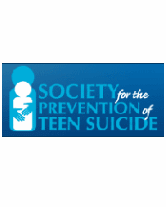The answer is FALSE. It probably comes as no surprise to anyone who works with teens that parents are usually the last to know about something that is troubling their child. In one study of youthful suicide attempters, 86% said they never informed a parent about their suicide attempt. In fact, we know that if teens ARE going to share information about their emotional lives, the person they turn to first is usually a friend. Kids talk to each other about everything, which is why it's so important to teach them how to respond to a suicidal confidence. No matter whom a kid tells about suicide, however, the response is always the same: talk to someone who is trained to know how to help.
Even if teens do say something about suicide, not all parents take these statements seriously. "I want to kill myself" has unfortunately become what we call a 'throwaway' statement for a lot of kids… it's something they say, without thinking, to express frustration. Because it has become such a commonplace statement, even if kids say it and really mean it, adults may simply chalk it up to their child having a bad day. Both educators and parents need to be to encouraged to ask follow-up questions when they hear a child say something about suicide. Even if it is said in exasperation, asking about it opens up communication about an important topic that is often off-limits between parents and teens.
When we're talking about younger children, the assumption is often made that we don't have to worry about their thinking about suicide because they are too young to cognitively understand the meaning of death. And while suicide is a rare event in children before the age of 10, we do know that there has been an increasing number of suicide attempts in children between the ages of 10 and 14 years. Parents of these younger children would do better staying alert for signs of distress and risk than expecting these younger children to talk about their intentions. For young children, signs of risk and distress often involve changes in the play behavior. Their play behavior becomes more intense, and repetitive themes of loss, anger, and sadness are acted out. Often, the level of the child's play regresses and becomes similar to that of younger children.













